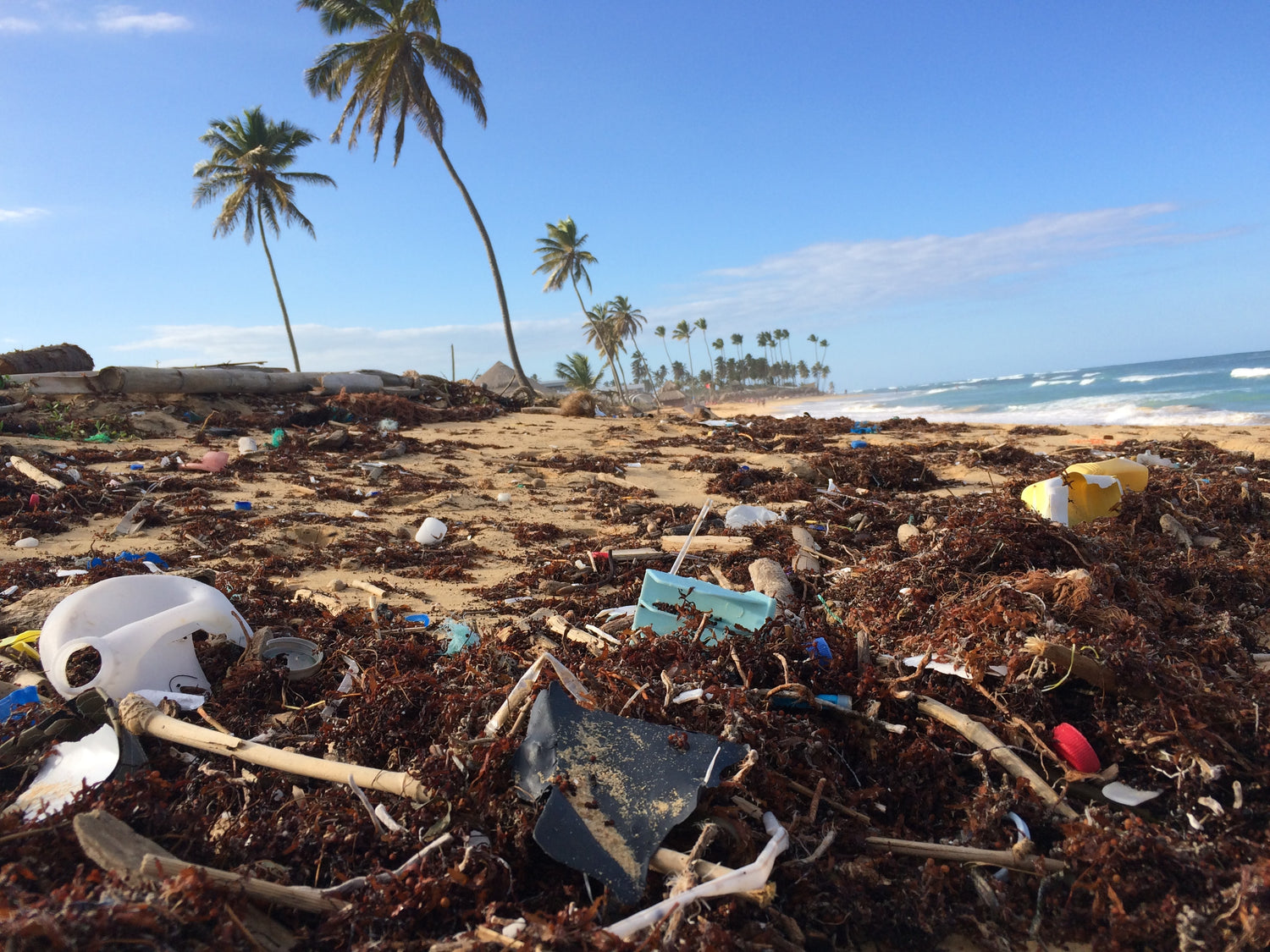At Seea we are committed to producing our collections in ways that are better for the environment. This means a lot of thought and intention goes into every step of the production process, right down to how our fabrics are made and where they come from.
Nearly 80% of our collection is made from recycled content - this is a priority of ours because it helps extend the lifespan of materials that would otherwise end up in landfills.
We're excited that each year more and more recycled fabrics are coming to market. The more there is a demand for it, the more the infrastructure to support it will be implemented.

But, for the average person, the process of recycling can be confusing - it's one of those things that feels shrouded in mystery.
We drop our aluminum cans, plastic cups, glass bottles and all sorts of other packaging and containers into bins and trust that someone will pick them up - their contents embarking on a long journey to be recycled into something new.
But where does it go, how is it recycled into materials that can be reused, and how much of it just ends up in the landfill?
Do we have to sort our recyclables and does recycling differ from state-to-state or even city-to-city and how do we know what we can actually recycle?
Is recycling part of the solution to a more sustainable future or is it a ruse?
Does it even matter?
These are the questions we've been asking ourselves for some time, and we know you might share in this confusion, too.
We were fortunate to meet Tina Nguyen, sustainability consultant and self professed trash nerd, who works with local governments and businesses to increase waste diversion from landfill while advancing zero waste education. She was kind enough to share her knowledge and insight with us on the topic.  Words by Tina Nguyen
Words by Tina Nguyen
It’s true, our recycling system has some serious issues.
But, first, it's important to understand how we got to where we currently are with recycling.
In the past few years, there have been two narratives about recycling dominating many national news headlines. The first one that appeared is “recycling is broken” and after that came “recycling is a myth.” Here’s the background to each storyline.
Recycling is broken
For decades, the definition of ‘recycling’ for wealthy countries was (and still is), collection and sorting of materials to be exported overseas to Southeast Asian countries where not even 100% of the materials would be recycled due to contamination.
In 2018, China banned the import of recyclables which exposed the lack of local recycling infrastructure and market here at home in the U.S. As a result, trash companies were sitting with a bunch of recyclable materials that they already paid to get processed but couldn’t sell for a profitable price because with China’s ban, vendors were not interested in buying this material.
So trash companies ended up putting recyclables in the landfill for a period of time because it was cheaper than selling it at a loss or simply just letting bales of recyclables sit on their facilities for an unknown future.
This is what spawned the narrative of ‘recycling is broken.’ And it was and is true because the U.S.'s recycling system still is somewhat ‘broken.’ However, China’s ban is forcing the development of local recycling infrastructure, which is the better long-term solution since it eliminates the financial costs and greenhouse gasses (GHG) emissions of transportation overseas while stimulating a local market for products made from recycled content.
Recycling is a myth - or is it?
In light of our broken recycling system making headlines, journalists began investigating the history of recycling in general. In particular, NPR conducted an in-depth investigation of recycling and the plastics industry and uncovered that, for more than half a century, “the plastics industry has engaged in an aggressive campaign to deceive the public, perpetuating a myth that recycling can solve the plastics crisis.”
The ‘recycling is a myth’ narrative stems from the fact that we’ve been purposely misled by plastic manufacturers to believe that all plastics are recyclable, and the public is just now learning the truth: most plastic products are not recyclable because their chemical composition makes it impractical to convert it back into its original form, the state it needs to be in, to be used as input for a new product
In general, the more plastic gets recycled, the flimsier it gets, the harder it is to turn it into something that meets product quality standards.
Plastics 1-2 get recycled the most and even then, this ‘recycled’ plastic still needs to be mixed with virgin plastic to achieve the same quality of a new product.
Plastics 3-7 (and now there’s an 8) are still processed by various waste haulers but it’s not guaranteed that they ultimately get recycled because the recycling infrastructure for them is limited.
If there are no vendors interested in purchasing this type of used plastic, the waste hauler will either sell it to a vendor at a loss or landfill it. In other words, it’s not always guaranteed plastics 3-7 are recycled even if certain haulers and municipalities publish that they are acceptable in their recycling program.
The key takeaway? The last 2 decades saw an explosion of plastic production in a recycling system that was never intended to handle the volume or types of plastic products now being generated. The relatively recent mass production of plastic is the key reason why recycling is broken and why it’s been said to be a myth.
So does recycling even matter?
Yes - recycling absolutely still matters!
Longstanding commodities of fiber, metal, and glass are still being recycled as they always have been. In fact, aluminium can be recycled infinitely, which saves energy, reduces the need for mining, keeps it out of the landfill, and is just better, overall, for the environment.
With that said, our recycling system was never equipped to handle such high volumes of waste. This level of increased consumerism and mass production of plastics would ‘break’ any system that was not prepared for it, which is why we have seen leakage from global waste systems into our oceans. But people should not be put off by recycling because right now, it still remains as the best waste management treatment we have (prevention is the best).
Recycling diverts waste from landfills. Landfills emit greenhouse gasses which are linked to climate change. And climate change, as we know, is linked to a multitude of environmental issues. Related to the ocean alone, climate change links to increased sea temperatures, sea level rise, ocean acidification, and coral bleaching, amongst other issues. When we participate in our local recycling services, we are reducing greenhouse gas emissions from landfills.
At the core, everything is made of something. If the product is recyclable, but it’s not being separated for recycling by consumers, it undermines all of the value that went into making that thing, which includes physical human labor, extraction of natural resources, the time and energy spent in the manufacturing process, etc. Recycling enables us to make the most out of that initial input over and over and over again. Additionally, recycling helps to create jobs in both the recycling and manufacturing industries which is a major socioeconomic benefit.
So what can you do to increase the likelihood of your recyclables actually getting recycled?
If in doubt - Find out
There is no universal recycling system, nor is there a standard on how to manage the complexity of this diverse practice. Nearly every state and country has different rules about how to recycle because different places are serviced by different trash companies. Trash companies have different technologies which determine what is and isn’t acceptable. For example, some cities are able to recycle milk and juice cartons, some are not.
The motto is, “if in doubt, find out.” Cities provide information for residents and businesses on their website. Type the name of your city and the words “recycling guidelines” into an online search engine and look for the result that has “City of…” in the URL; it is usually the first result.
Clean your recyclables !
The rule of thumb is to keep your recyclables clean and dry. Don’t leave residual food inside containers. Don't put any liquids into your recycling bins. Sometimes the idea of cleaning something just to throw it away feels pointless, but it’s not waste until you waste it. We need to shift from ‘waste’ to ‘resource’.
Other actions you can take:
-
If your residence doesn’t have recycling, contact your property manager or City’s Public Works department to request for the service. In CA, it’s the law!
-
Vote - stay informed on upcoming bills to stem plastic pollution and make sure you're registered to vote (recent wins)
-
Use less disposable plastic. Remember your reusables. Refusing single use plastics will be the most common action you can take to reduce your plastic waste.
-
Love a product but it comes in plastic? Send a request to companies letting them know that you want their products to be provided in non-plastic packaging, i.e., your favorite yogurt product, spring mix salad, toothpaste tubes, etc.
-
Buy products made with majority recycled plastic content to support the circular economy
Keep in mind that there has been an unfair reliance on consumers to be the responsible parties in dealing with the rise of disposable items. This is after producers and retailers have decided, without consultation, to wrap everything in plastic or replace reusable items with single use items, often making this the only option available to the masses. As we continue to take individual steps to address the plastic waste problem, it’s important to be compassionate with ourselves and our waste journey. Celebrate the small wins and use that positive energy to take the next step.
Key Resources to Learn More:
- How Big Oil Misled The Public Into Believing Plastic Would Be Recycled https://www.npr.org/2020/09/11/897692090/how-big-oil-misled-the-public-into-believing-plastic-would-be-recycled
- PLASTIC WARS https://www.pbs.org/wgbh/frontline/film/plastic-wars/








1 comment
Kim
Love this reminder to consume less and recycle those materials that can be reused in our current systems! My big takeaway: "it’s not waste until you waste it. We need to shift from ‘waste’ to ‘resource’.”
Love this reminder to consume less and recycle those materials that can be reused in our current systems! My big takeaway: "it’s not waste until you waste it. We need to shift from ‘waste’ to ‘resource’.”